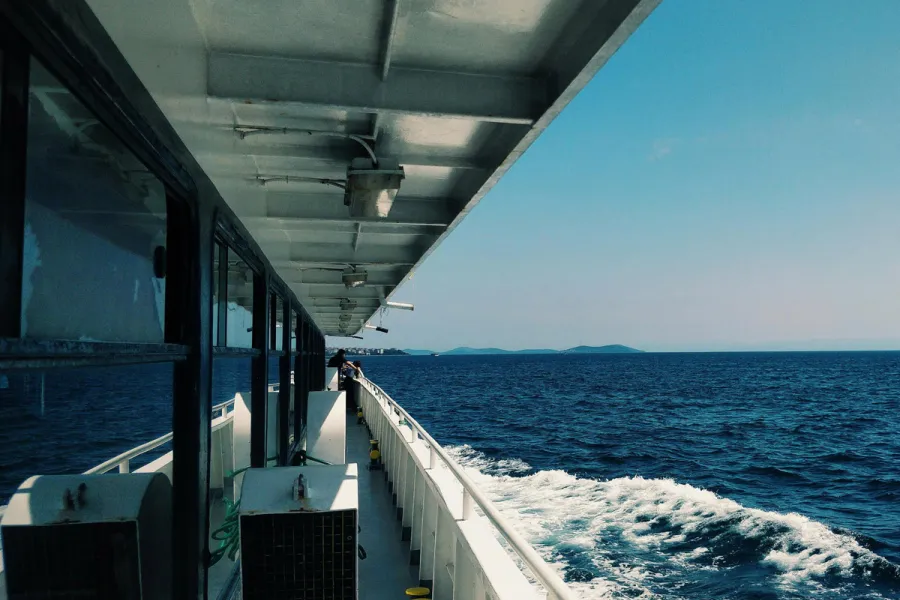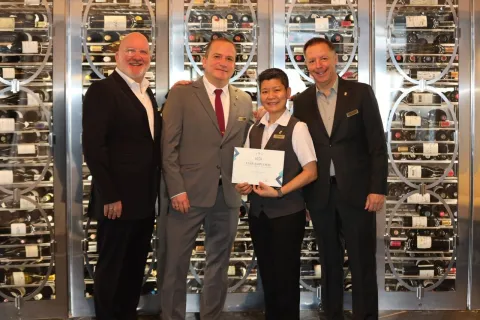
Life at sea can be exhilarating, offering an escape from the hustle of land-based routines, but it also comes with its own set of challenges. For many seafarers, the sense of adventure and freedom is often coupled with long stretches of isolation. While working at sea, there are plenty of activities available, from socialising with fellow crew members to exploring the ship, but after a while, the daily routine can start to feel monotonous. The open sea, with its endless horizon, can be beautiful yet somewhat boring, especially when you’re away from family and friends for long periods. Whether you’re in a long stretch between ports or have a few free hours during a shift, using that time to learn something new or further your education can not only prevent boredom but also help you develop skills that will be valuable on land.
Passengers: Making the Most of Extra Time
Passengers often have more free time during their voyages, which presents an excellent opportunity to focus on personal growth and learning. Unlike crew members, passengers don’t have a demanding work schedule to navigate, so they can engage in educational activities throughout their trip. Whether you're on a long cruise or a leisurely voyage, this time can be used to enhance your knowledge, pick up new skills, or even further your academic career.
There are countless online resources that passengers can take advantage of to make the most of their time at sea. Whether it's learning a new language, improving a technical skill, or expanding your knowledge in a particular field, the options are endless. Many online courses, podcasts, and educational videos are available to help you make the most of your free time. This allows you to use your travel time efficiently and grow both personally and academically. With fewer distractions, passengers can often focus deeply on learning and achieving their educational goals.
Additionally, passengers can explore educational apps that allow them to track their progress and stay motivated throughout their journey. Many apps focus on personal development, offering courses in areas like time management, leadership, and even mindfulness. This creates a great opportunity to focus on improving oneself holistically, helping to enhance not just academic growth but also personal well-being. By the time the voyage is over, passengers may find that they’ve not only had a relaxing trip but also made significant progress in their learning and personal growth.
Crew Members: Balancing Work and Learning
For crew members, the routine at sea can be demanding. Between long hours of work, unpredictable schedules, and limited free time, it can be challenging to find time for education. However, modern ships are increasingly equipped with internet access, opening up learning opportunities even during long voyages. One of the main challenges is balancing work and study, but with proper time management, crew members can make steady progress in their education while at sea.
When balancing both work and study, it can sometimes feel overwhelming. In such cases, there are practical solutions to help manage the load. If you're wondering who can write my essay for me, a reliable writing service can take some of the pressure off. These services can help with assignments, ensuring you meet deadlines and submit high-quality work. By utilizing professional assistance, crew members can stay on track with their educational goals while keeping up with their demanding schedules at sea.
It’s essential to carve out moments during less busy times to focus on studies. Crew members can use their free hours or off-shift periods to catch up on online courses, read educational materials, or work on assignments. For example, dedicating an hour each day to study or breaking it into shorter, more manageable sessions throughout the day can keep the momentum going. Creating a study schedule based on work hours can help make sticking to a plan easier. This way, crew members can gradually build their skills and continue progressing academically without feeling overwhelmed.
Making the Most of Online Resources During Downtime
When you're out at sea, downtime might feel like it’s either too long or too short. But no matter the length of your free time, it’s essential to make it count. Online resources are an incredible tool for learning new skills, and you can use these resources in creative ways during your time on deck or in between shifts.
For example, let’s say you’re interested in learning a new language. You can practice new words and phrases, and you don’t need to sit at a computer to use it. During a break or while walking the deck, you could practice the language on your phone. Imagine strolling around the ship while repeating Spanish or French vocabulary, working through phrases like "¿Dónde está el restaurante?" or "Je voudrais un café." You can even use the time on deck to memorise grammar rules or practice pronunciation out loud. It might look like talking to yourself, but this can make the learning process more interactive, especially when you start associating words with real-world objects you encounter daily.
Practical Learning While Walking the Deck
Imagine you’re learning basic math or working on new formulas. Many websites offer courses in everything from algebra to physics, so you could mentally run through problems while walking, reciting formulas, or solving equations in your head. If you’re learning a technical skill, like how to work with digital tools or coding, you can practice coding concepts mentally or repeat new programming commands out loud as you pace. Why not make use of that time by mentally rehearsing? As you walk the deck, you’re not just taking in the fresh sea air—you’re reviewing your new knowledge, turning each step into a productive learning moment.
Turning Your Ship's Whiteboard Into a Study Tool
For crew members, the ship’s common areas often come with whiteboards, which are perfect for practising what you’ve learned. If you're learning new vocabulary in a foreign language, write down the words or phrases you’ve been studying during your free time, and practice saying them aloud in front of the whiteboard. Try forming sentences or conjugating verbs as you see them written down. This act of writing reinforces the memory of the words and allows you to see them in context. Plus, you can ask fellow crew members to quiz you on the board. This makes it a group activity, adding some social interaction to your studies, which can be an extra boost for motivation.
Putting Theory Into Practice with Interactive Learning
Learning doesn’t always have to be about reading through textbooks or watching videos. During your off-time, why not take your laptop outside or find a quiet spot below deck and begin working through some real-time exercises? When you’re learning, you are turning theory into practice. This interactive nature makes it possible to absorb new skills in short bursts, which is perfect for busy schedules.
Audiobooks and Podcasts for Learning on the Go
Not all learning requires a screen. Audiobooks and podcasts are great alternatives for busy sailors who want to consume knowledge while they’re on the move. Whether you're learning business skills through a podcast on entrepreneurship or diving into the world of history with an audiobook, you can always have access to learning materials during your shifts or breaks. With services like Audible, you can download books about everything from leadership to digital marketing. This makes learning flexible and portable, perfect for a busy crew member or a passenger with limited time in one place.
When you're walking along the deck, listening to podcasts can make the time feel productive. For example, you can listen to a podcast on personal finance or even international relations, and then discuss it later with fellow passengers or crew members. These casual yet valuable discussions help solidify new ideas and knowledge.
Combining Learning with Physical Activity
Learning doesn't have to be stationary. Think about combining your educational efforts with physical activity. If you're learning about marine biology, why not take the time while walking around the deck to observe the ocean, thinking about the ecosystems you've been learning about? Each wave you see might remind you of the concepts you read about in your online courses. The movement of the ship can be a perfect opportunity for visualising scientific principles or even reviewing formulas for technical exams.
If you're working through a history course, you could challenge yourself by mentally linking the events you’re learning about to places you see on the horizon. For instance, if you're studying ancient civilisations, think about the Mediterranean or other areas that you might pass by. Not only does this create a deeper connection to the material, but it also makes learning feel more immersive and relevant to the world around you.
Conclusion: Making the Most of Your Time at Sea
Whether you’re a crew member or a passenger, there’s no shortage of ways to stay productive and continue learning while at sea. With the right online resources, you can use the time onboard to your advantage, learning new skills, tackling online courses, or even practising what you’ve already learned. By being creative with your study habits—whether it’s mentally reviewing lessons while walking the deck, writing on a whiteboard, or listening to podcasts on the go—you can turn your free time into an opportunity for growth. With platforms, you can be learning and improving no matter where the ship takes you. All it takes is a little time management and creativity to make sure your journey is one of both adventure and personal growth.
Crew Insights
Articles and experiences shared by crew members working on cruise ship. Find out more about ship life at sea together with tips and advices for first time crew members and cruise oldtimers.












